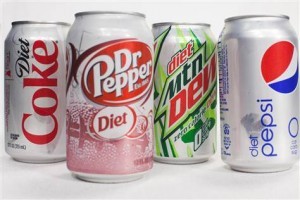This past weekend we had a birthday party for our daughter Olivia. And as with many parties like this there was food, cake and drinks. [caption id="attachment_4341" align="aligncenter" width="300"] What healthy people drink, right? Because we're all trying to do the best we can with our health we have diet pop as an offering. And I'm sure many of you are the same. If you drink pop you probably opt for the diet version, right? Not many health conscious people are buying regular Coke or Pepsi when they do the grocery shopping. So why do we choose diet pop? Well I guess it has to do with the fact that we don't want empty calories. I mean if I'm going to eat or drink something I better be getting some kind of nutritional benefit from it such as protein, healthy fat, vitamins, minerals, hydration etc. Regular pop offers virtually none of these but does have a dose of sugar, carbonation and is acidic. But besides avoiding the extra calories by drinking diet pop the other reason to avoid it was for the fact it wouldn't alter our blood sugar levels. In other words we didn't have to be concerned with the connection to type II diabetes and other metabolic disorders. Until now. A new study in the journal Nature found that consuming an artificial sweetener may impair glucose metabolism similar to that seen in type II diabetics. In the study researchers fed mice and humans one of three treatments, glucose, saccharin (the artificial sweetener) or glucose. You may be familiar with saccharin as the sweetener in Sweet N Low. Anyways, only the group fed saccharin showed altered glucose metabolism. So what is taking place that is accounting for this altered glucose metabolism? Well it appears that the mice and people fed saccharin...
Measures of Effective Fitness Training
- Chris Collins
- Fitness
- Training
- Fitness Equipment
- 1804 Hits
- 0 Comments
-
In the last article I discussed some things that are commonly used to assess the effectiveness of a training session. And I explained why mainy of these factors may not qualify as determinants of effective training.So what does constitute an effective training session? Well if you looked at the list from the previous post all of the items had something in common. And that is that they were subjective measures and therefore difficult to measure. What we should be using to evaluate the effectiveness of our workouts are objective and measurable tools. Below is a list of 7 Things You Can Measure to Determine the Effectiveness of Your Workouts. #1. Body Changes This one is fairly easy, low cost and doesn't take much time. And it's easy to see trends over time. For example you can track the following: * weight * bodyfat * tape measures * pictures from the front, back and side And while the bathroom scales you can pick up at any big box store aren't the most accurate way of measuring bodyfat they are consistent and do not depend on the expertise of the user. Photos are great because they will show changes in body shape and tone when the net gain on the scale may be zero. #2. Tracked Workouts We record every workout at Okanagan Peak Performance Inc for our clients and ourselves. We are so aware of the numbers that when a staff members posts that they were able to dumbbell snatch 60 lbs for 4 reps I know this is a personal best. And I know the previous best. And when they set their previous best. Besides loads we know distances and times during energy system workouts. We know heights jumped on plyo boxes. And we know how we felt during and in...
